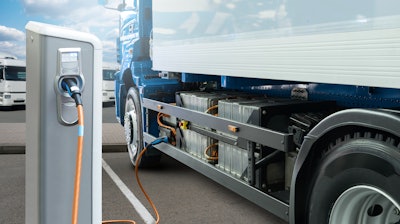
The bridge to alternate fuels continues to shrink, according to results presented by Fleet Advantage.
In fact, the majority of respondents (59%) indicated they are operating their trucks five years or less before replacement, which continues to support today’s greater focus on shortening asset life cycles. This number was also 59% last year, up from 45% two years ago, and coincides with most respondents (40.7%) listing improved fuel economy as the top motivating factor in securing new trucks, followed by lower maintenance and repair expenses (33.3%), both being benefits of shortening truck life cycles.
“It continues to be clear that business agility, financial flexibility, and a strategic eye toward future fuel options remain front and center for companies with transportation fleets and for-hire fleets,” says Brian Antonellis, SVP of fleet operations, for Fleet Advantage. “Over the years our industry benchmarking surveys have been a great tool to identify trends and microtrends that are important to our industry’s decision makers. This year is no different, as we’re seeing the bridge to alternate fuel technology continue to shrink, and now fleets are beginning to realize they need the right analytic tools to identify the adoption time that makes the most sense for their organizations.”
Key takeaways:
- Another 18.5% mentioned they are focused on right-sizing the number of trucks in their fleet to align with economic conditions. Furthermore, slightly more than a quarter of respondents (25.9%) said they feel today’s higher costs of fuel, maintenance and borrowing make long-term contracts less attractive.
- Fleet respondents also noted they were reducing their life cycles as more than half of respondents (51.9%) indicated they have the fewest number of trucks in their fleet model years 2018 or older.
- Last February, 65% of respondents said they were most interested in electric trucks, while 15% cited hydrogen and 25% CNG. Meanwhile, 45% of the respondents also noted that the timeframe to deploy alternative fuel trucks would be 5-10 years. In the current survey, those numbers are shifting, with 33.3% indicating EV over the next 5-7 years (29.6% saying another 10 years), and 38.5% indicating hydrogen. This timetable for electric truck adoption continues to change, as just two years ago the majority (54%) said they didn’t plan to deploy electric trucks for 5-10 years.
- Also, the most recent survey shows that roughly 25% of fleets still do not see the value in adopting electric nor hydrogen trucks, respectively. All of this change reinforces the fact that fleets have unique timelines in how they wish to bridge over to alternate fuels.
- Costs and ROI calculations on alternate fuel trucks are still concerning to nearly 90% of fleet executives. In fact, 44% of respondents said they do not currently have a proper way of fully calculating all costs involved with alternative fuel trucks, and another 44% said they are not yet satisfied there will be a decent ROI on these vehicles. And, 22% cited unknown resale values, life expectancy, range and fueling infrastructure, weight and distance, and unproven technology as other barriers to adoption.
- However, when asked what type of financing options would make the most sense for adopting alternate fuel trucks, 52% said they would prefer a lease finance structure.

















